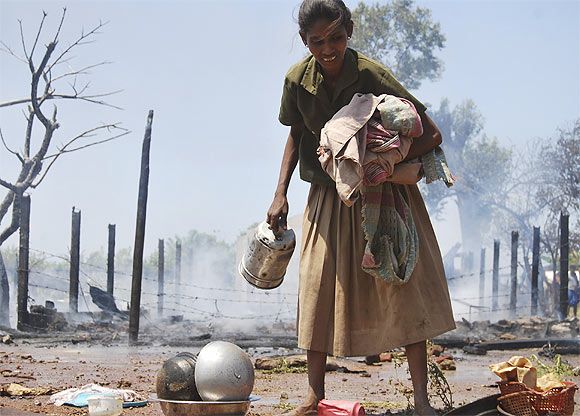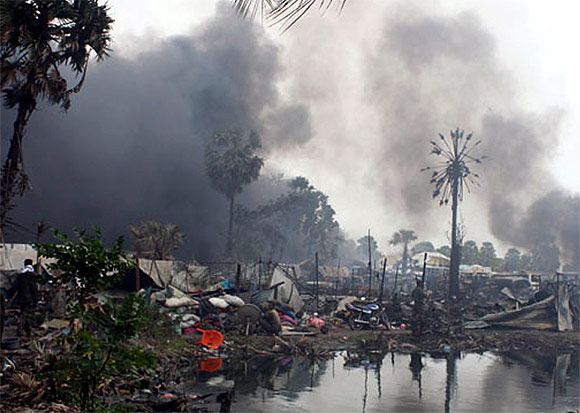Hindu American Foundation: 'As an organisation that works on issues affecting Hindu minorities... in the civil war although all groups were affected, Hindu temples and Hindu institutions were disproportionately affected, and Hindus continue to be affected.'
Sri Lanka's Ambassador to the United States Prasad Kariyawasam: 'Assume that Sri Lanka is referred to the ICC through the UN Security Council -- which will never happen because Sri Lanka has enough clout to block it. But assume it is. Still, the ICC cannot handle it because retrospectively they don't have jurisdiction.'
Aziz Haniffa/Rediff.com reports from Washington, DC

The Hindu American Foundation -- which in its 10-year history has grown in influence on Capitol Hill with key US lawmakers -- has vehemently denied rumors that its taking an interest in human rights issues in Sri Lanka for the first time, and calling for an international independent probe into war crimes in the country during the Mahinda Rajapaksa government's 2009 successful but brutal offensive against the Liberation Tigers of Tamil Eelam, was at the urging of the pro-Eelam lobby in the US.
Earlier, this week, September 15, the HAF hosted Nobel Peace Prize nominee and award-winning filmmaker Callum Macrae at the National Press Club in Washington, DC, as he released his new 30-minute documentary -- funded by a grant from HAF -- on what was described as 'the current search for justice for the Sri Lankan people following war crimes committed by all sides during the Sri Lankan civil war.'
HAF has assailed the Obama administration's recent announcement of its significant shift in US policy on the issue and indicated its intention to support the Sri Lankan government, saying for years the US supported an international investigation, but recently changed its position.
Samir Kalra, an attorney, senior director and Human Rights Fellow, HAF, who has authored all of its human rights reports published annually, including the 11th titled Hindus in South Asia and the Diaspora, said, 'The US and other UNHRC (United Nations Human Rights Commission) member countries have a moral responsibility to deliver justice to the victims of Sri Lanka's civil war, particularly the estimated 40,000 Tamil civilians that were massacred in the closing months of the war in 2009.'
'An international independent investigation is the best means to achieving accountability and justice for the victims,' Kalra added, and declared, 'A purely domestic mechanism will not heal the country's wounds or allow it to move forward.'
There is no truth at all or credibility at all to these allegations," that the pro-Eelam lobby in the US was behind HAF's interest in Sri Lanka and the alleged abuses by the security forces in 2009, Kalra told Rediff.com
"We have not received any money from the pro-Eelam lobby and we have taken this project up as an independent HAF project," he added.
Kalra also denied that the pro-Eelam lobby "convinced us to take up this project," and reiterated that "we decided to do this on our own and we have not received any money from them at all."
"We are doing this independently -- HAF has always worked on human rights issues and created its policies independently," he said, but acknowledged, "We do partner with other groups when we have a common issue, but in this particular case, we are taking it up as an independent organisation because we believe it's important to provide justice to the Tamil victims of the war."
"We do want to clarify also that we don't condone the actions of the Tamil Tigers (the LTTE) and we believe that they should be investigated for their role in committing war crimes during the war."
"Our ultimate goal," Kalra said, "is just to get the victims justice -- the victims were caught between the government and the Tamil Tigers and they are the ones who ended up suffering. So we are coming at it from the perspective of the victims and making sure that the victims receive justice."
"We definitely find the (UNHRC) report very encouraging in terms of stating that a domestic inquiry would not be credible and there must be an international involvement, including international prosecutors, judges and investigators involved in whatever mechanisms is created for Sri Lanka."
"We are very much in sync with the report because even if the Sri Lankan government was sincere and genuine in wanting the provide some type of mechanism, its legal framework and its criminal justice system is not where it needs to be in order to have an effective process," Kalra argued.
"There needs to be an international component to this to make sure that the victims have trust and feel confident that the process will in fact provide justice and accountability for them," he added.
The UNHRC report released on September 16, which sought international judges to probe alleged Lankan war crimes, argued that 'a purely domestic court procedure will have no chance of overcoming widespread and justifiable suspicions fueled by decades of violations, malpractice and broken promises.'

Kalra acknowledged that it was a no-brainer that the main reason HAF has gotten involved in the Sri Lanka issue is because it believes that the majority of the people who were killed, persecuted and had their human rights violated were Tamil Hindus.
"As an organisation that works on issues affecting Hindu minorities... in the civil war although all groups were affected," he explained, "the majority of Tamils are in fact Hindus. Hindu temples and Hindu institutions were disproportionately affected during the civil war, and Hindus continue to be affected."
"Currently in Sri Lanka you see Hindu temples being destroyed by Sinhala Buddhist nationalist groups and replaced with Buddhist stupas," Kalra claimed, "and so, this issue is disproportionately affecting Hindus, although Christians, Muslims and others are also affected."
"But our interest," he reiterated, "is from the perspective of Hindus being affected and Hindu temples being affected."
'Those who want to bring disrepute to Sri Lanka have their own reasons'
Sri Lanka's Ambassador to the United States Prasad Kariyawasam -- without naming the Hindu American Foundation by name -- took a hefty swipe at HAF for calling for an international and independent probe of alleged atrocities committed by Sri Lankan security forces against civilians in the 2009 offensive against the Liberation Tigers of Tamil Eelam.
Ambassador Kariyawasam, a distinguished career diplomat who served as Sri Lanka's high commissioner in New Delhi (2009 to 2014) and also the island's top diplomat in Geneva, when asked about HAF's involvement in Sri Lankan issues for the first time in its 10-year history, felt the foundation probably had an agenda for doing this, particularly at a time when Sri Lanka had "a good story to tell."
In an interaction that followed his address at the Carnegie Endowment for International Peace on the recent elections in Sri Lankan and the 'New Prospects for US-Sri Lanka Relations,' Ambassador Kariyawasam told Rediff.com, "With regard to the groups that are canvassing for a different objective in this city and elsewhere in America, I don't want to comment on why they do that because I do not want to shoot the messenger."
"But they may be having their own reasons for doing that," he said, and added, "but I can tell you that approach is not helpful because the main platform of those who are having alternative means about how to handle Sri Lanka's issues, is that we think we can handle all the allegations locally in Sri Lanka with our own institutions."
Ambassador Kariyawasam bemoaned the efforts by these groups, particularly at a time when he said the new government in Colombo is "revamping, reworking and reorganising" these institutions to investigate these allegations.
The main agenda of these groups, Ambassador Kariyawasam felt, "is to refer Sri Lanka to the International Criminal Court -- that is their main plan," but he emphasised, "that approach will not work."
"The ICC statute does not have retrospective jurisdiction," Ambassador Kariyawasam explained, "and therefore, the ICC, even if they wish, cannot address Sri Lankan issues of 2009 because that is retrospective."
"So, what's the point in asking for Sri Lanka to be referred to the ICC except that it's just to keep the pot boiling so to speak?" Ambassador Kariyawasam asked.
"Assume that Sri Lanka is referred to the ICC through the UN Security Council -- which will never happen because Sri Lanka has enough clout to block it," Ambassador Kariyawasam said. "But assume it is. Still, the ICC cannot handle it because retrospectively they don't have jurisdiction."
Thus, he argued, "The clamour to have Sri Lanka referred to the ICC, is for what purpose? We don't understand except that it is to keep Sri Lanka at the spot, to bring disrepute to the country for no reason."
"Those who want to bring disrepute to Sri Lanka have their own reasons. So, for us, that clamour, that demand, does not make sense."
"If crimes have been committed by any party in Sri Lanka," Ambassador Kariyawasam said, "they can be handled by our current legislation."
"The moment you bring war crimes, you are taking it to another level of law that will make proving that crime more difficult because war crimes can only happen in an internal conflict."
"But there are crimes that happened in Sri Lanka outside the conflict, which were more serious for the people than other crimes and these crimes have to be handled, and some of these crimes are being addressed even today -- some of the famous disappearance cases."
"So, we don't want to bring the level of the proof required even more difficult, because under international crimes, the proof required will be much higher than the normal crimes," the ambassador added.
If there is this constant clamour to take Sri Lanka to the ICC, he felt, the new government's efforts to bring closure to the investigations would be in limbo.
"So all these demands by these actors in this part of the world, and some in Sri Lanka as well with regard to expanding the scope of the Sri Lanka situation and taking it to the ICC and the international crime level is not meaningful, is not useful."








